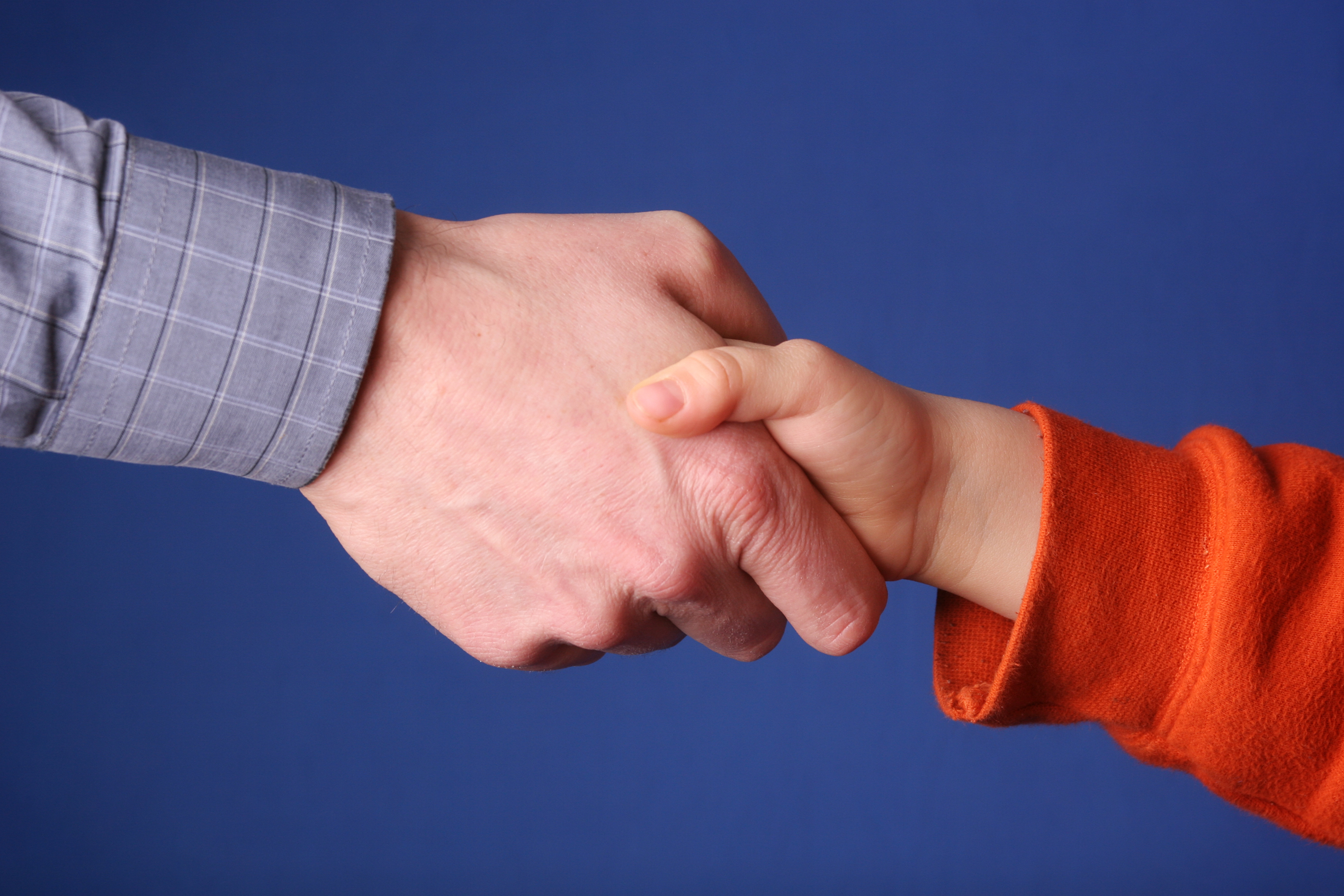Mr.? Mrs.? Miss? I have no idea how my kids should address adults.
When did acknowledging someone's existence get so complicated?


Growing up in the '80s, it was a given that you'd address the adults in your life as Mr. or Mrs. or maybe Ms. You would assume that your friends' parents shared the same family name. It wasn't very confusing. If you were at Amy Smith's house, her mom was probably called Mrs. Smith. Simple. It just wasn't something we had to even consider. But that's not the case today. Now that I'm a parent myself, I'm trying to figure out what my kids should call grown-ups, and it seems that "Mrs. Smith" is a moniker of the past. These days (at least in Los Angeles) most kids call adults by their first names. But do I want to adopt this casual practice in my own household? Not really. Can I avoid it? Not really.
As the mother of a 2-year-old and a 4-year-old, I'd prefer that my kids use some sort of title to address adults; first names seem so casual! But the roadblock is that no one else does it. I don't want my children to be the only ones who use more formal terms, but I'm also not totally comfortable with them calling their friend's mom "Emily." Miss Emily? That's cute, but the "Miss" is a misnomer if the person is, in fact, a woman, and not a girl. Despite my qualms, we mostly use first names at this point. I'm going with the flow as I figure this out. And it's somehow less offensive when toddlers and preschoolers use first names; it's actually sort of adorable.
Perhaps I'll find it more obnoxious when, say, a random 9-year-old addresses me with something like, "Yo, Lindsey." My friend Julia says she plans on going by "Mrs. Luce to any new kids she meets who are above the age of 7. "Having an older kid who I've just met call me Julia rubs me the wrong way," she told me. I feel the same. So sometimes I encourage my small children to throw a Mr. or Ms. in front of a first name, but the problem is that my husband and I are inconsistent about this. They know Mr. Carlos and Miss Adriana; Mr. Jon and Ms. Nelly. But they also know Jenny and Clay and Maritza. Hopefully as they get older, adding honorifics will get easier.
The Week
Escape your echo chamber. Get the facts behind the news, plus analysis from multiple perspectives.

Sign up for The Week's Free Newsletters
From our morning news briefing to a weekly Good News Newsletter, get the best of The Week delivered directly to your inbox.
From our morning news briefing to a weekly Good News Newsletter, get the best of The Week delivered directly to your inbox.
Maritza, a mom of two herself, points out one thing that's changed since we were kids: Families now have varied last names. My last name is Hunter Lopez, for instance, while my kids and husband are Lopez. Many (actually most) married women we know didn't change their last names. Some men we know did change their last names. And not all parents are married, of course. And what if the adult in question doesn't identify with the gender binary at all? Then you have the added neutral option "Mx" (pronounced "mix"). All these societal factors contribute to this forming of the new norm. It's no longer safe to assume.
When I taught high school a few years ago, we all still went by last names. Ms. Hunter Lopez quickly became Ms. Hu Lo because double-barrel names are sometimes a bit much for kids. My friend Vanessa says that her son's school has the kids use "Teacher." "So it's like, Teacher Maria or Teacher Val," she says. "Now I'm toying with that too. Like, 'Hi Neighbor Jill.' Very Daniel Tiger, but I kind of dig it."
My friend Bridget says her kids' school uses first names. "The only time I cringe is when my 3-year-old addresses our elderly neighbor as 'Beth' with no prefix." Age may be a compromise; if the person is older (but older than who — me?) we can use Mr. or Ms. If they're the same age or younger, we can do first-name basis. My friend Leah used Mr. or Miss with first names growing up. "But now I only have my daughter call people Miss and Mr. if they're older than my age. Like our neighbor on one side is an older lady who she calls Miss Marilyn."
But Leah's from Texas, so maybe that has something to do with it. We certainly can't ignore regional differences. In notoriously casual California, it makes sense that we'd do away with Mr. and Miss and Mrs., but other parts of the country haven't been so quick to give it up. Southern mama Erin says she always called people Mrs. and Mr. She's going to have her son do the same. My pal Suzy is in New York City where they use first names for adults, but she actually can pinpoint when the name change happened in Pennsylvania. "My brother is five years younger and all of his friends' parents just did first names. So my parents were Mr. and Mrs. to my friends but to his friends they were first name only."
A free daily email with the biggest news stories of the day – and the best features from TheWeek.com
Well, that's complicated. If societal norms continue to change this quickly, I can only imagine how kids will be addressing me 30 years from now.
Writer and blogger Lindsey Hunter Lopez is currently immersed in the world of parenting thanks to her two small children. Her work has appeared at Parents, SheKnows.com, L.A. Parent, OK!, CNN, FOX News, and Preen, among other publications. Lindsey is a graduate of the University of California, Santa Cruz, and New York University. She's endlessly fascinated by parenting trends, subcultures, social media phenomena, and children's clothing.
-
 Syria’s Kurds: abandoned by their US ally
Syria’s Kurds: abandoned by their US allyTalking Point Ahmed al-Sharaa’s lightning offensive against Syrian Kurdistan belies his promise to respect the country’s ethnic minorities
-
 The ‘mad king’: has Trump finally lost it?
The ‘mad king’: has Trump finally lost it?Talking Point Rambling speeches, wind turbine obsession, and an ‘unhinged’ letter to Norway’s prime minister have caused concern whether the rest of his term is ‘sustainable’
-
 5 highly hypocritical cartoons about the Second Amendment
5 highly hypocritical cartoons about the Second AmendmentCartoons Artists take on Kyle Rittenhouse, the blame game, and more
